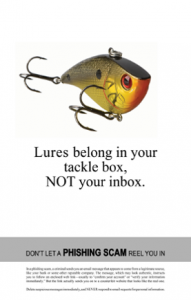Phishing attacks pose a major risk to any organization and continue to target people at WCU. Since these threats won’t go away any time soon, it is important to provide education about the warning signs of phishing, the potential risks of falling prey to an attack, and how we can protect ourselves from getting hooked.
You may not realize it, but you are a phishing target at school, at work, and at home.
- Beware sketchy messages. Phishy messages may include a formal salutation, overly-friendly tone, grammatical errors, urgent requests, or gimmicks.
- Avoid opening links and attachments. Even if you know the sender, don’t click on links that could direct you to a bad website (hover over the link to see the website it will take you to). And do not open attachments unless you are expecting a file from someone.
- Verify the source. Check the sender’s e-mail address to make sure it’s legitimate. If in doubt, just delete the message.
What to do if you get phished through your WCU Email account:
- If you still have the email in your Inbox, Right-click on it, then select Junk, Block Sender. This will help prevent these emails from coming to your Inbox in the future.
- Forward the email to ithelp@wcu.edu for any further action needed for the campus community.

